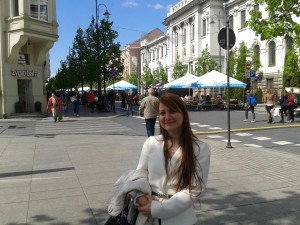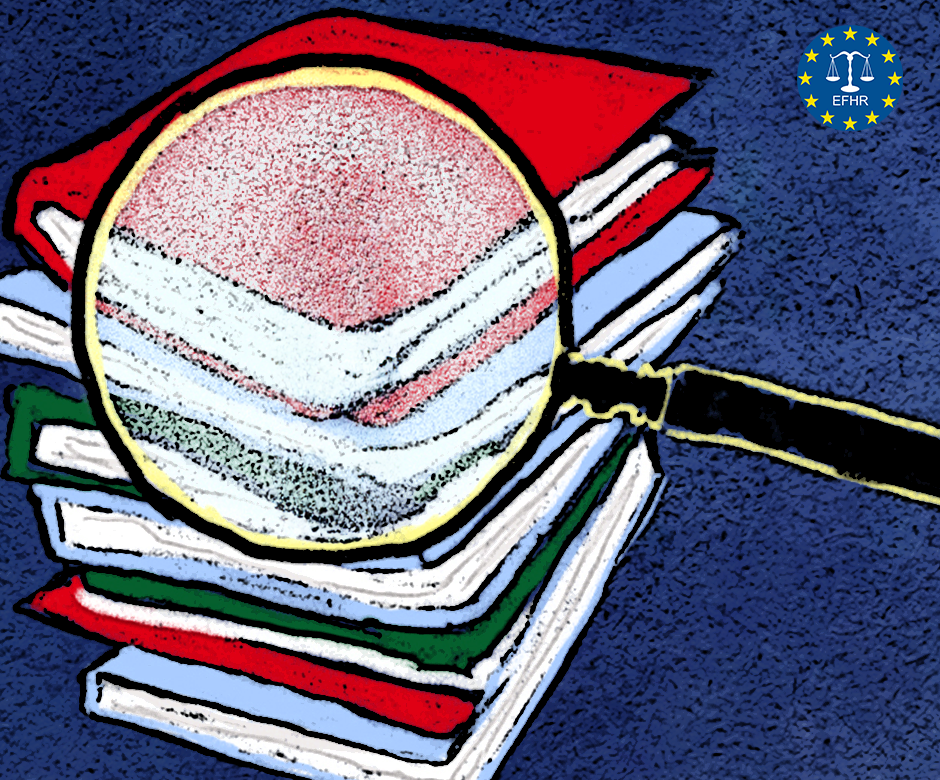- 2015/06/26
Interview with Izabella Vajda on her EVS experience at EFHR

The European Foundation of Human Rights (EFHR) “Youth for Human Rights” project, submitted by the Foundation as part of the promotional campaign “Youth mobility” in the programme Erasmus +, is coming to an end. We decided to ask one of our EVS volunteers – Izabella – about her impressions of EFHR and her time in Vilnius.
1) How did you first learn about EVS?
I learnt about EVS from a friend of mine. She told me that this programme is a great opportunity for young graduates from all over Europe to get further professional experience in a specific field. Having become interested in EVS, I consulted the official website and found out some key information about the application procedure, the list of host organizations, the length of stay and the assistance that the host organizations provide to their “guest colleagues”. Finally, I got in contact with a sending organization in my home country, Hungary.
2) Why did you choose Lithuania and EFHR?
I have a long history with Lithuania. I have been here several times in recent years and when I decided to go for EVS, I already knew exactly where I wanted to go. I also had a very clear understanding about which field I wanted to work in. Prior to my EVS, I worked in the Hungarian Ministry of Justice and Public Administration where I dealt with an educational project for the Hungarian national minorities living in the Carpathian basin. Having consulted the profile of the list of host organizations in Lithuania, I found out that the European Foundation of Human Rights deals with exactly what I am passionate about: human rights and the rights of national minorities.
3) What is the most memorable moment of your stay?
I collected a lot of memorable moments from my stay in the foundation and from Lithuania in general. I think I made a good choice by coming here. If I have to highlight some special moments, I would mention our Human Rights workshops that we organized a number of times at Mykolas Romeris University and at other schools together with my EVS colleague, Magdalena Gryciuk. These experiences were very valuable as they allowed us to improve our public speaking skills and also share and improve our knowledge on Human Rights. As I said, it is difficult to highlight just one good moment, so let me mention some more. For example, I was also very glad that I had the chance to represent our organization during a meeting with delegates from the European Commission. This was an amazing day and I felt pleased that our foundation trusted us and our knowledge enough to send us to such events. Besides that, I also appreciated having the chance to attend a very informative Human Rights conference in the Seimas in April. As I used to work in public administration, this was a particularly interesting experience for me. I also enjoyed the events that took place in our foundation such as award ceremonies for drawing competitions, a human rights training course with a world famous lawyer and a conference for ambassadors. On the occasion of one these events, teachers belonging to the Polish national minority told me that they are very happy that I chose to come here and contribute to the promotion of Human Rights in Lithuania. This is definitely a very heartwarming memory for me!
4) What was your worst moment during your EVS? Were there any?
There is a saying that where there is light, there must also be shadow. Of course, not all days are the same and I felt, at some points, that it was a challenge to feel motivated. This was due to many factors that we discussed during our EVS training where I learnt that this is a completely natural way to feel – many EVS participants experience the same feelings. There can be ups and downs during the ten months. I also believe that the Lithuanian weather conditions affected my mood quite a lot. It may sound funny, but I come from Hungary where the summer is very hot and the winter is more mild. In Hungary we have much more sunshine between October and January than in the Baltic States. I think that people coming to this region must be prepared and take a double winter coat before starting EVS because I have to admit that I was very cold for many weeks and I got ill a couple of times as well. Unfortunately, not many people speak English in hospitals – and this was an issue of concern to me.
5) Do you have any message for the next EVS volunteers?
Yes, I do. In my opinion, everybody wants to get the best from this programme. Nobody wants their experience to turn into something negative, but if you have concerns about something it is better to discuss them in an open and friendly manner. I think that peaceful dialogue is always the best way to solve problems. Besides, when you start EVS, you also have to “adapt” to your organization so that you make it easier for yourself and them to work together.
6) Future plans and projects?
My objective is to keep working in the field of national minority rights and, at the moment, it seems that this will become a reality. I am not sure yet – so I cannot tell you more! However, I would definitely want to stay on this path as I believe that there is so much more to do in this field. I would like to contribute to positive change!
EFHR























